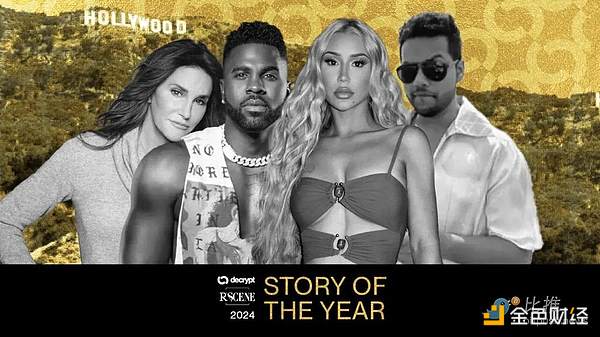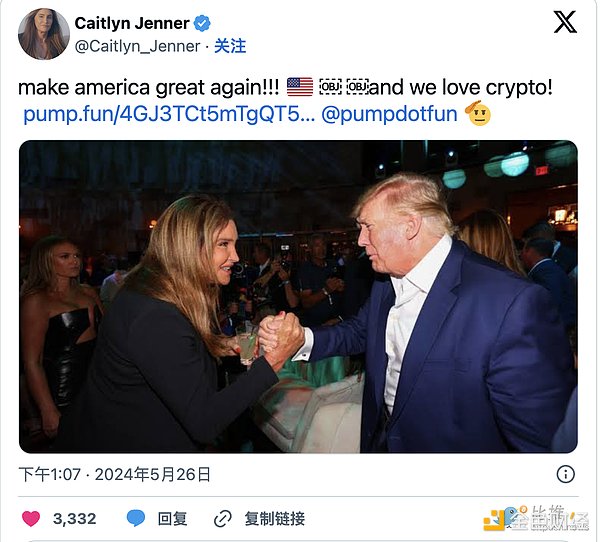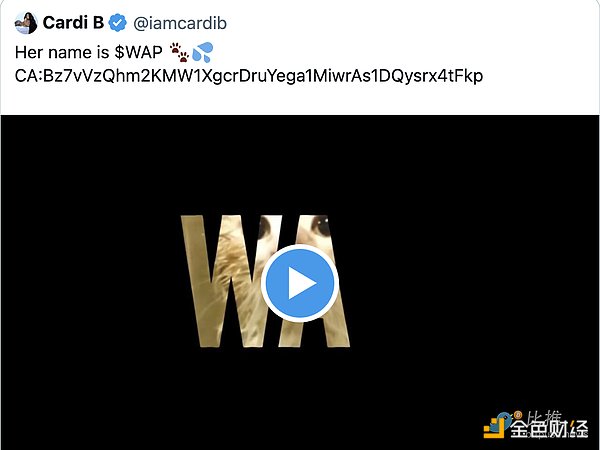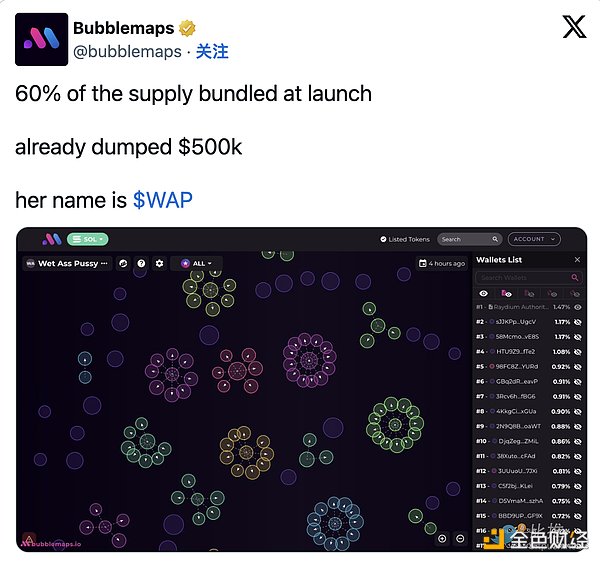Source: Decrypt; Compiled by: BitpushNews
Celebrities getting involved in cryptocurrency is nothing new. As early as 2013, Brock Pierce, a former child star, co-founded Blockchain Capital, opening the precedent for celebrities to "go into the sea" of cryptocurrencies. From former US President Trump to star Lindsay Lohan, celebrities from all walks of life have flocked in, trying to make money in the wave of cryptocurrency.

However, the celebrity effect is not always a panacea. Some people use their influence to stand up for crypto projects, but the results are often unsatisfactory. In the past decade, the U.S. Securities and Exchange Commission (SEC) has taken action against more than a dozen celebrities for illegally promoting cryptocurrencies, and Kim Kardashian and boxing champion Mayweather have been punished for this. What is even more regrettable is that many celebrities are also deeply involved in the FTX exchange crash scandal, which almost destroyed the entire crypto industry.
If celebrity participation in cryptocurrency is still a "cliche", then the "celebrity meme coin" craze that emerged in 2024 can be called a "new trick". As meme coins replace NFTs as the new favorite of speculators, a large number of celebrities have followed suit, personally issuing their own meme coins, and even trying to build a business model around these tokens.
In the past year alone, nearly a dozen big European and American stars have launched their own meme coins. The community feedback is mixed, with more negative effects.
Traditional investors often believe that Bitcoin investors have a higher risk tolerance, but meme coin fanatics are the real risk takers - just like in the Wild West, the price of the tokens in their hands may soar or plummet in an instant.
This madness is vividly demonstrated on the meme coin issuance platform Pump.fun. Olympic decathlon champion Caitlyn Jenner launched her own meme coin on the platform, kicking off the celebrity meme coin craze.

There have been many "worldview-destroying" stories on Pump.fun. One user threatened to end the life of a small goldfish if his meme coins were not bought; another threatened to sit on the toilet until the market value of his token reached $50 million (when the market value reached $10 million, he actually shaved off an eyebrow). Some people have taken more extreme actions, such as a young man who "fen (second tone) himself". While Pump.fun was hot, in May 2024, Jenner teamed up with Trump, who was actively preparing for the election at the time, to issue his own token in a high-profile manner. This move caused great controversy, and many people even suspected that Jenner's social account was stolen, or that this was an AI deep fake scam. Even the founder of Pump.fun was shocked.
Alon (pseudonym), co-founder of Pump.fun, said in an interview with Decrypt: "I was almost stupid at the time." He called it one of the craziest moments in the company's short but wonderful history: "We tweeted that she issued a coin, and then we were stunned. 'Did she really issue a coin?' I couldn't understand what was going on at all. It was crazy."

It turns out that the driving force behind Jenner's "farce" was crypto promoter Sahil Arora. He signed a contract with Jenner, promising to issue tokens for her, and agreed to pay a $50,000 advance and 80% of the revenue share.
However, the cooperation soon turned into a farce. Jenner accused Arora of breach of contract and publicly cursed on Twitter: "F...k Sahil Arora! He cheated us!"
Jenner said in an interview with Decrypt in May that Sahil Arora "disappeared" after showing her several wire transfer records and owed her "a lot of money." Arora did not respond to Decrypt's request for comment at the time.
But this was just the beginning.
After cooperating with R&B singer Jason Derulo to issue tokens, Derulo also publicly accused Arora of being deceived. Arora responded that all of this was "part of the script." Since then, Arora has issued tokens for rappers Rich the Kid and Lil Pump, and these stars have also complained about similar experiences.
Later, rappers Cardi B, Waka Flocka Flame and Sean Kingston also issued their own tokens, but did not publicly cooperate with Arora.

Data visualization company Bubbleworks published a long article on the social platform X to "blast" Arora, claiming that he earned $30 million this year by issuing meme coins for celebrities.
Nick Vaiman, co-founder and CEO of Bubblemaps, said in an interview with Decrypt: "Many tokens have obvious red flags from the beginning, such as high control, malicious manipulation, and obvious "cutting leeks" strategies."

Of course, not all celebrity meme coin issuances ended in farce. Australian musician Iggy Azalea is an exception. Although her token MOTHER was questioned by Bubblemaps for being "sniped" by 20% of the supply at the time of issuance, she claimed that she was unaware of it.
Bubblemaps’ on-chain detectives pointed out that this could only happen if the token contract address was leaked to insiders in advance.
However, after Iggy Azalea participated in a Twitter Spaces event, demonstrated her understanding of encryption, and publicly criticized Arora, the public opinion changed.
Alon, the founder of Pump.fun, said: "When we found out that she really knows the business, we were very optimistic about her. It felt great."
A few months later, more and more celebrities issued tokens and then became junk coins. Jenner even issued an Ethereum token, causing the price of her original Solana token to plummet.
So, what is the current status of these celebrity meme coins?
As of writing, Jenner’s meme token on Solana is worth just $357,000, while her Ethereum token is worth just $139,000, well below their previous peaks of $42 million and $7.5 million, respectively.
Jason Derulo’s JASON token is down 97.8% from its peak, with a market cap of $783,000;
Waka Flocka Flame’s FLOCKA token is down 99%, with a market cap of just $238,000; and the bundled token WAP has plunged 99.65%, with a market cap of less than $138,000.
Iggy Azalea told Decrypt: "Most celebrities are involved in this with the worst intentions. I don't think any of them really want to do crypto tokens, they just want to cash out quickly and walk away."
As these tokens collapsed and celebrities left in droves, the first lawsuit followed. In November 2024, a group of investors filed a class-action lawsuit against Jenner and her agents, accusing her of misrepresenting her Solana meme coin and failing to register it as a security.
Jenner's team did not respond to Decrypt's request for comment.
Some cryptocurrency legal experts say more such civil lawsuits may appear in the future. "We will see an increase in the number of lawsuits involving celebrity endorsements of meme coins," said Andrew Rossow, a cyber law attorney, in an interview with Decrypt. "Celebrities will increasingly be held accountable for their promotional activities and may even face broader legal liability for being the 'sellers' of these digital assets." Digital asset lawyer Carlo DeAngelo said: "Jenner's lawsuit is a clear warning to any celebrity who thinks they can use their fame to over-promise and deliver meme coins just to make a quick buck." Some crypto advocates believe that celebrity meme coins help attract young people to crypto. For example, Arora once told Decrypt that he started the celebrity meme coin craze to make cryptocurrency more mainstream than ever before.
Nick Vaiman, founder of Bubblemaps, concluded: "For a narrative to succeed, it needs universality, hope, and role models. It needs to be able to attract the masses and create real success stories to maintain hope and inspire others. However, celebrity crypto projects have failed to establish such a virtuous cycle and instead have become a predatory mechanism that squeezes liquidity from retail investors and leaves everyone penniless."
 XingChi
XingChi
 XingChi
XingChi Anais
Anais Edmund
Edmund Edmund
Edmund Jixu
Jixu Hui Xin
Hui Xin Hui Xin
Hui Xin Clement
Clement Catherine
Catherine Beincrypto
Beincrypto